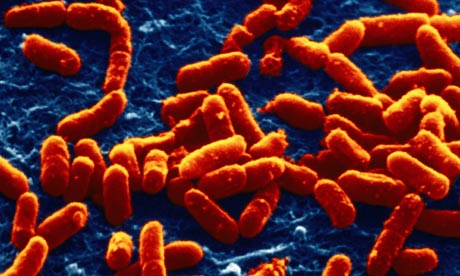 Scanning electron micrograph of Escherichia coli bacteria (E. coli). Photograph: S. Lowry/University of Ulster/Getty
Scanning electron micrograph of Escherichia coli bacteria (E. coli). Photograph: S. Lowry/University of Ulster/Getty
The World Health Organisation is today urging countries to take action against the spread of drug-resistant bacteria, which threaten to deprive us of antibiotics which once seemed miracle cures for infectious diseases.
The WHO is speaking out following a Lancet paper written by Professor Tim Walsh in the UK and colleagues in India, which warned of the spread of bacteria carrying a new gene, which they called NDM 1. These bacteria become resistant to almost all the antibiotics designed to fight them. The main piece I wrote about it, called "Are you ready for a world without antibiotics?" can be found here.
Unfortunately, the Indian government reacted badly to the Lancet paper, which suggested that one of the factors behind the spread of NDM 1 could be medical tourism. Among those in the UK and elsewhere in Europe who were found to have these drug-resistant bacterial infections were people who had traveled to India for necessary surgery or cosmetic treatment.
An Indian government press release on August 12 said that
the conclusions are loaded with inference that these resistance genes/organism possibly originated in India and it may not be safe for the UK patients to opt for surgery in India. Concluding sentence presents a frightening picture which is not supported by any scientific data....such organisms may be circulating more commonly in the world due to international travel but to link this with the safety of surgery hospitals in India and citing isolated examples to show that due to presence of such organism in Indian environment, India is not a safe place to visit is wrong.
India has a lot to lose. Medical tourism is a boom industry, growing at 30% a year. It would be unfair to single it out, because NDM 1 will be elsewhere too. Scientists only know it is in India because they have been able to look.
But the point the WHO is making today is that no country is any more an island. All need to look to their infection control and guard against the wrong and cavalier use of antibiotics, such as their sale on the streets without prescription, because drug-resistance knows no frontier posts. This is what it says:
Those called upon to be alert to the problem of antimicrobial resistance and take appropriate action include consumers, prescribers and dispensers, veterinarians, managers of hospitals and diagnostic laboratories, patients and visitors to healthcare facilities, as well as national governments, the pharmaceutical industry, professional societies, and international agencies.WHO strongly recommends that governments focus control and prevention efforts in four main areas:
* surveillance for antimicrobial resistance;
* rational antibiotic use, including education of healthcare workers and the public in the appropriate use of antibiotics;
* introducing or enforcing legislation related to stopping the selling of antibiotics without prescription; and
* strict adherence to infection prevention and control measures, including the use of hand-washing measures, particularly in healthcare facilities.
It ends on a hopeful note:
Successful control of multidrug-resistant microorganisms has been documented in many countries, and the existing and well-known infection prevention and control measures can effectively reduce transmission of multi-drug resistant organisms if rigorously and systematically implemented.
But it's clear that pretending there is no problem or sitting on our hands is asking for disaster.
